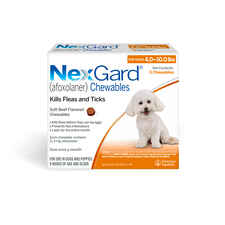Ehrlichia in Dogs: Symptoms and Treatment
Doctor of Veterinary Medicine

While efforts are made to answer all questions as quickly as possible, if an immediate answer is required or if your pet is in need of urgent or emergency care, contact your pet's veterinarian immediately.
Doctor of Veterinary Medicine

You will receive an answer from Dr. Lindsay and our vet/tech team as soon as possible, usually the same day.
All answers are provided for informational or educational purposes only, and are intended to be a supplement to, and not a substitute for, the expertise and professional judgment of your pet's veterinarian.
It may be necessary to consult your pet's veterinarian regarding the applicability of any opinions or recommendations with respect to your pet's symptoms or medical condition.
CloseDoctor of Veterinary Medicine

An error has occurred, please reload the page and try again.
CloseWhile efforts are made to answer all questions as quickly as possible, if an immediate answer is required or if your pet is in need of urgent or emergency care, contact your pet's veterinarian immediately.
There is no answer related to your question
What is Ehrlichia?
While most people are most concerned about the tick transmitted Lyme disease, there is another disease transmitted by certain species of ticks known as Ehrlichia. Signs of Ehrlichia in dogs can occur 1-3 weeks after the bite of an infected tick, and in the acute phase of the disease, symptoms may last up to a few weeks. The organism likes to live inside blood cells and can destroy the platelets involved with blood clotting. Organisms can also be found inside lymph nodes, the bone marrow, liver and spleen.
Symptoms of Ehrlichia in dogs
During the acute phase can vary from joint pain and stiffness, fever, lethargy, bruising and anemia. Many dogs can overcome the infection on their own, but others may enter a subclinical or chronic phase of infection, which can be much more difficult to clear and/or treat. In some cases, chronic neurological symptoms can occur as well as inflammation of the eyes. Some dogs can have repeated bouts of illness, especially during periods of stress.
Diagnosis of Ehrlichia is typically based on blood tests often run at the veterinary office, in conjunction with clinical signs being present of illness. It is important to recognize that many dogs with Ehrlichia can test positive but have no clinical signs, and in those cases treatment is not always needed.
Canine Ehrlichia treatment
Treatment for dogs with Ehrlichia is typically instituted with a 3 to 4 week course of either Tetracycline or Doxycycline-dnu, and most animals improve within several days of instituting therapy.
The best advice that can be given to prevent this disease is to practice tick prevention including the use of products such as NexGard, K9 Advantix II, and Frontline Plus. Collars specifically formulated to protect against ticks, such as Seresto may also be used. Although humans can also occasionally come down with Ehrlichiosis, it is only through tick bites, and not from dogs.
 Swipe
Swipe




























